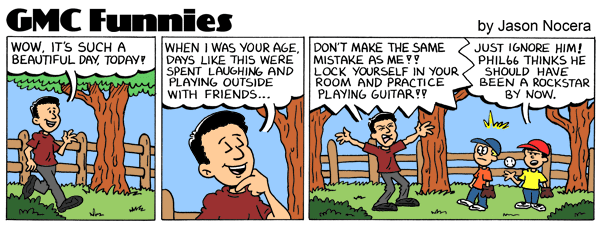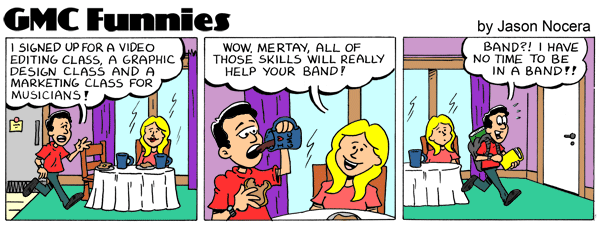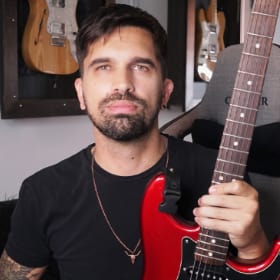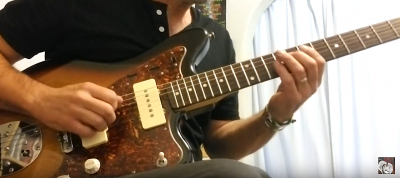Keys & Chords |
|
|
|
|
|
| Dec 1 2015, 08:51 PM |
|
Hello everyone,
If you played three chords from three different keys what would you use to improvise a solo over them without changing position for each chord? How would you work out what to play? Cheers -------------------- SEE MY GMC CERTIFICATE  “Success is not obtained overnight. It comes in instalments; you get a little bit today, a little bit tomorrow until the whole package is given out. The day you procrastinate, you lose that day's success.” Israelmore Ayivor |
|
|
||
|
|
|
|
| Dec 1 2015, 09:34 PM |
|
Can you give me a chords exemples ?
|
|
|
||
|
|
|
|
| Dec 2 2015, 12:18 PM |
|
Sorry, I will do this evening.
It was a question I've always thought about because in the past I've come up with a little chord progression and been told "you can't play those together because they're not from the same key" and I've said "but I like them like that", and they said, "doesn't matter, can't do it ". I've searched for Internet sites hoping to find one where you enter the chords of your progression and it tells you which key/scales are available but I guess that's a big ask. Please don't get too complicated I know no theory Cheers Phil -------------------- SEE MY GMC CERTIFICATE  “Success is not obtained overnight. It comes in instalments; you get a little bit today, a little bit tomorrow until the whole package is given out. The day you procrastinate, you lose that day's success.” Israelmore Ayivor |
|
|
||
|
|
|
|
| Dec 2 2015, 12:26 PM |
|
everything to me is improvisable, maybe your question didnt belong to the subject or lesson that was discussed? examples would help
|
|
|
||
|
|
|
|
| Dec 2 2015, 03:15 PM |
|
This is totally possible but it depends on each progression. The first step would be to follow the chords with the arpeggios of each of them. That's the first thing that you can do. Then, how to continue depends on the chords used but many times the scales are build combining the main notes of the arpeggios of each chord, but once again, each example is different and your ear is always the main judge.
-------------------- My lessons
Do you need a Guitar Plan? Join Gab's Army Check my band:Cirse Check my soundcloud:Soundcloud Please subscribe to my:Youtube Channel |
|
|
||
|
|
|
|
| Dec 2 2015, 05:34 PM |
|
No such thing as doesn't go together because they're not in the same key. If it sounds good, it is good and can absolutely be 'justified' by theory ... if one so desires (though not necessary to just make music).
Give us 3 chords. Any 3 chords - and I'll tell ya how to play over it in one position. This post has been edited by klasaine: Dec 2 2015, 06:54 PM -------------------- - Ken Lasaine
https://soundcloud.com/klasaine2/foolin-the-clouds https://soundcloud.com/klasaine2/surfin-at-the-country-hop Soundcloud assorted ... https://soundcloud.com/klasaine3 New record ... http://www.cdbaby.com/cd/kenlasaine Solo Guitar ... https://www.youtube.com/playlist?list=PLXZh...5iIdO2tpgtj25Ke Stuff I'm on ... https://www.youtube.com/playlist?list=PLXZh...b-dhb-4B0KgRY-d |
|
|
||
|
|
|
|
| Dec 2 2015, 10:08 PM |
|
This is totally possible but it depends on each progression. The first step would be to follow the chords with the arpeggios of each of them. That's the first thing that you can do. Then, how to continue depends on the chords used but many times the scales are build combining the main notes of the arpeggios of each chord, but once again, each example is different and your ear is always the main judge. Thanks Gab, I don't fully understand what arpeggios are, I always thought it was playing a chord by picking each string individually but my John Fruscianti lesson led me to think otherwise No such thing as doesn't go together because they're not in the same key. If it sounds good, it is good and can absolutely be 'justified' by theory ... if one so desires (though not necessary to just make music). Give us 3 chords. Any 3 chords - and I'll tell ya how to play over it in one position. OK this isn't the best recording, I just got the nearest guitar to hand and plugged in, and sorry but it's 4 chords. This is something like I might come up with for a Creativity Workshop, I'm not the best at playing chords and rhythm so please don't pull it apart, it's just a quick example. The chords are G,D,A,E. For all I know they might be in one key, they might not but how would I work out if they are and how would I know what scale/s to play over them? Thanks for you help everyone. I'm trying to get a grip on basic theory https://soundcloud.com/gmcphil-1/gdae -------------------- SEE MY GMC CERTIFICATE  “Success is not obtained overnight. It comes in instalments; you get a little bit today, a little bit tomorrow until the whole package is given out. The day you procrastinate, you lose that day's success.” Israelmore Ayivor |
|
|
||
|
|
|
|
| Dec 3 2015, 03:25 PM |
|
You can it make as complicated as you want but you can also just play over that entire progression in A blues or A major pentatonic and even A minor pentatonic.
*Hitting a G# (not in any of the above mentioned scales) over the E chord is a great choice. This post has been edited by klasaine: Dec 3 2015, 03:26 PM -------------------- - Ken Lasaine
https://soundcloud.com/klasaine2/foolin-the-clouds https://soundcloud.com/klasaine2/surfin-at-the-country-hop Soundcloud assorted ... https://soundcloud.com/klasaine3 New record ... http://www.cdbaby.com/cd/kenlasaine Solo Guitar ... https://www.youtube.com/playlist?list=PLXZh...5iIdO2tpgtj25Ke Stuff I'm on ... https://www.youtube.com/playlist?list=PLXZh...b-dhb-4B0KgRY-d |
|
|
||
|
|
|
|
| Dec 3 2015, 05:08 PM |
|
You can it make as complicated as you want but you can also just play over that entire progression in A blues or A major pentatonic and even A minor pentatonic. *Hitting a G# (not in any of the above mentioned scales) over the E chord is a great choice. Thanks Ken, if you have time, can you explain why A blues or A major pentatonic will work with those chords? I'm hoping to understand more to help me when I do the creativity workshop. Do you know any good books for theory that explain and give examples of how to utilise the info rather than just waffling on and bamboozling the reader? Thanks again. Phil -------------------- SEE MY GMC CERTIFICATE  “Success is not obtained overnight. It comes in instalments; you get a little bit today, a little bit tomorrow until the whole package is given out. The day you procrastinate, you lose that day's success.” Israelmore Ayivor |
|
|
||
|
|
|
|
| Dec 3 2015, 06:35 PM |
|
can you explain why A blues or A major pentatonic will work with those chords? Do you know any good books for theory that explain and give examples? The chords A, D and E are diatonic (in the key of) to the key of A major - I, IV and V. The G chord is a very common substitute chord for the vii chord in the key (usually a G#º). More importantly, G major 'works' because our modern ears are accustomed to hearing it. It's been used in popular music since the late 19th century and it's an everyday occurrence in rock and roll. If 'I' was to keep it as simple as possible, I would actually just use the A minor pentatonic scale: A C D E G. The next step would be to try it all with A major penta: A B C# E F# (then work the 'blue' note in over both those scales - Eb). *You may be asking "why does the C note work over the A major and E major chords? C is the minor 3rd of A and the #5 of E". The simple answer is (again), our ears are used to hearing it. There are complicated, theoretical reasons why but it's not necessary at this point to get into it. Left to my own devices I would combine the A min penta and the A maj penta (and blues) with chord tones from each of the individual chords. G - I'd add B and F# D - definitely hit an F# A - C# E - B and G# As far as books are concerned, I wouldn't worry about getting into any of them until you have a firm grasp of plain old major scale harmony. You can get that here at GMC either through mentoring or just searching the site or get a private teacher (IMO, the best option). This post has been edited by klasaine: Dec 3 2015, 06:58 PM -------------------- - Ken Lasaine
https://soundcloud.com/klasaine2/foolin-the-clouds https://soundcloud.com/klasaine2/surfin-at-the-country-hop Soundcloud assorted ... https://soundcloud.com/klasaine3 New record ... http://www.cdbaby.com/cd/kenlasaine Solo Guitar ... https://www.youtube.com/playlist?list=PLXZh...5iIdO2tpgtj25Ke Stuff I'm on ... https://www.youtube.com/playlist?list=PLXZh...b-dhb-4B0KgRY-d |
|
|
||
|
|
|
|
| Dec 3 2015, 07:15 PM |
|
Thanks Ken,
Very informative and still a bit complicated for me but it does help and points me in the right direction. I have had two private tutors around twenty years ago. See my post "My first scale" in the theory section Thanks again for your time Ken, I appreciate it Phil -------------------- SEE MY GMC CERTIFICATE  “Success is not obtained overnight. It comes in instalments; you get a little bit today, a little bit tomorrow until the whole package is given out. The day you procrastinate, you lose that day's success.” Israelmore Ayivor |
|
|
||
1 User(s) are reading this topic (1 Guests and 0 Anonymous Users)
0 Members:




























